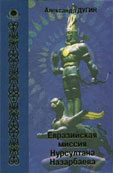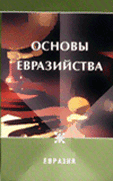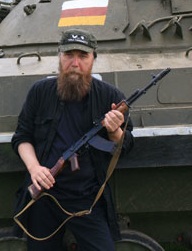 |
|
|||||
|
|
||||||
|
||||||||||||
|
Megan StackRussian nationalist advocates Eurasian alliance against the U.S.
Aleksander Dugin, a popular theorist in hard-line circles, advocates an alliance between the former Soviet Union and the Middle East. He says Georgia crisis could be start of a real conflict with U.S. Megan Stack, Los Angeles Times Staff Writer, September 4, 2008 Writer, political activist and father figure for contemporary Russian nationalism, Aleksandr Dugin is the founder of Russia's International Eurasian Movement and a popular theorist among Russia's hard-line elite. He envisions a strategic bloc comprising the former Soviet Union and the Middle East to rival the U.S.-dominated Atlantic alliance. The Times interviewed Dugin this week at his Moscow office, a room draped with flags bearing the slogan "Pax Russica." The following are excerpts. What is your assessment of Russia's place in the world now, and how should Russia be behaving with respect to the West? First of all, I advocate strongly a multipolar construction of the world. I think that the pretension of the United States to be the unique pole of the world . . . is completely wrong, immoral and unacceptable by the other great centers of power. We support the creation of great space, a few great spaces, instead of only one point of decision, the United States' decision. We think Russia should be in the vanguard of this process. Many in the West believe that Moscow deliberately provoked a confrontation over Georgia's breakaway republics. Who do you believe is responsible for the eruption of armed conflict? It was too risky for us to begin it. And I think, also, that as long as I have known [Russian Prime Minister Vladimir V.] Putin and [President Dmitry] Medvedev, they would like to avoid at any price direct confrontation with the United States. Their idea was that they should gain the time to prepare Russia to attack or to withstand the possible attack of the United States, and they needed 10 years. The reaction of Putin -- of Putin and Medvedev -- was such as it was only because they considered this an offensive, impossible and unacceptable provocation from the Georgians. And that was a reaction, not a planned strategic offensive. . . . [Putin and Medvedev] were not ready to start by themselves, by their will, such a difficult situation and a difficult war that doesn't seem to end. We political analysts we see that we could start such a war, but we could not end it. It is very far from the end. It is only the beginning of a real, and maybe very serious, and very dangerous for all of the sides, confrontation between us and Americans. What was the strategic purpose in recognizing the independence of Abkhazia and South Ossetia? Russia is, so far, completely alone in the recognition. First of all, by this step Russia confirmed its will to go until the end in this conflict. . . . It was a kind of demonstration of our serious and profound will to continue.
Second, we needed, and now we have gotten, juridical explication of what our armed forces were doing on the Georgian territory. Now it is more or less clear. . . . Regarding recognition, I think that if Russia will stay in this confrontation, if Russia will continue this demonstration of the firm decision and power, the other countries will, little by little, step by step, join the attitude toward South Ossetia and Abkhazia. It is not the rule that from now on we will recognize all the separatist regions. Absolutely no. We will recognize those separatists' regions that would be geopolitically on our side -- either on our side or on our friends' -- and opposed to the United States. The United States showed us this double morality. They recognized pro-American Kosovo and don't recognize anti-American, pro-Russian South Ossetia and Abkhazia. They don't recognize the integrity of Serbia, but they recognize the integrity of Georgia. How does Russia view the development of friendly relations between the United States and former Soviet republics such as Ukraine and Georgia? As a declaration of war. As a declaration of psychological, geopolitical, economic and open war. Putin was pro-Western at the beginning. He was pro-American. That was the reason of our criticism of his conduct. For example, after Sept. 11 we were against his help to United States and his steps toward United States. But little by little, he was confronted with the complete neglect of all Russian interests. With these neoconservatives, with Richard Perle or Dick Cheney, we always were helping. "We will sign here, it is so." Step by step, with the economy and the trade of energy resources, we finally found the force and the will to respond against this war. Because this war was not desired by us. It was a challenge. It was imposed on us by the United States. We consider that all of the post-Soviet space -- except the Baltic states -- we are dealing with Eurasian civilization. Not with European, not with the West. And to try to get these spaces out of our control, or out of our dialogue, or out of our special relations with them, based on history -- it was a kind of attack, a declaration of war. It is not, as Americans like to put it, a competition. . . . It was perceived to be not a competition but an act of aggression, as Napoleon or Hitler, and nothing else. When Russia faced a separatist movement in Chechnya, it reacted with a large-scale military attack and an air assault that turned [the Chechen capital of] Grozny to rubble. Yet Moscow has been quick to criticize [the Georgian capital of] Tbilisi for launching a military operation in its breakaway republic. Isn't there a double standard at work here? Yes. Yes. . . . It was reaction to a double standard by a double standard. I agree. If it's going to be a reaction to a double standard with another double standard, where does the cycle end?
The United States behaves as a unique pole that could define what is good and what is bad. . . . It will never end if something would not say, "stop it." . . . So we should demonstrate, stop it or you will repent. Maybe we also will repent, but you will repent. Stop it. You have been banned from visiting Ukraine. Do you believe that Ukraine will join NATO, and if so, how will Russia react? I think that most of the population of Ukraine doesn't want to come into NATO. The majority of the population, after the Georgian case more than before, wants to have a good relationship with Russia. Entrance to NATO will signify complete abolishment of any kind of relationship, and real, hard confrontation. Half the Ukrainian population consider themselves to be Russian -- politically, geopolitically, culturally, ethnically and so on. We could not conserve Ukraine without either a split or a compromise between two parts. President [Viktor] Yushchenko hollered to put me out of Ukraine and to prohibit me from entering in this state. I think it is his right. It's a sovereign state. . . . But I think by doing so he diminished his respect for different kinds of Ukrainian people. Because, you know, my ideas are very popular in eastern Ukraine and Crimea and there are many, many hundreds of thousands of people who are supporters of the Eurasian movement there. If Ukraine were to move into NATO, what do you think the Russian reaction would be? I think that Russian reaction would be to support an uprising in eastern parts and Crimea and I could not exclude the entrance of armed force there, as in the Ossetian scenario. But the difference is that half of the Ukrainian population is Russian, is directly Russian, and this half of the population regards itself as being oppressed by the values, by the language, by the geopolitical issues, completely against their will. So I don't think that, in this case, direct intervention of Russian armed force will be needed. I think on the eve of the entrance into NATO there will be public riots and the split of Ukraine into two parts. What do you think would happen if Ukraine were to push Russia's Black Sea Fleet out of [the Ukrainian port of] Sevastopol? I think it could be armed conflict there, because now we feel ourselves at ease, more or less. We are ready to continue in Georgia. But at the same time, we haven't finished in Georgia. It's far from the end, the situation there. We need Saakashvili's head. We consider him to be an aggressor and author of war crimes. Morally, I think our army and our political leaders are completely prepared to play hard, to play tough with the Ukrainian leader because we consider him to be an accomplice of Saakashvili. You have spoken of Iran as an alternative to American power. Are you still thinking of Tehran in this light? I think that Iran should and could be an ally of Russia. . . . Working with Iran, exchanging weapons and the possibility of resources and the base to transport natural resources from Eurasia and Iran, to combine our efforts in strategy, military, economy and energy -- we could create a real force to influence the whole Middle East. . . . With Iranians we have common interests . . . because I consider that to stop American unipolarity is the most important thing, the absolute thing. . . . These parties, these pro-Westerners here in the Russian government, they insisted that Iran, being fundamentalist, could at some time aggress us. But . . . that was a kind of propaganda against Iranians made by pro-American, pro-Western forces in Moscow. Your views on Vladimir Putin have fluctuated. I appreciated very much his concrete steps to reinforce political order in Russia, his steps to get away the oligarchs, to diminish influence of Westerners and to save Russian territorial unity in the Chechnya situation. But also I saw that he was encircled by pro-Western, pro-liberal politicians and advisors and experts . . . and that was main reason for my criticism toward him. But I think that now, after [Russia's military intervention in Georgia on] Aug. 8, Putin and Medvedev have passed the irreversible point. They have shown that the will and the decision to put the words into practice are in fact irreversible. So my support to Putin and Medvedev is now absolute. I was deceived by these circles. But at the same time, maybe the West also was deceived by them. And by Medvedev, also! Because I considered Medvedev to be the revenge of the liberals, and I protested. I think Washington and Brussels also saw the same and we were all deceived. Medvedev proved to be a real hard-core Russian patriot and statesman. So I admire such deception -- even if I was also the victim. Is Moscow overplaying its hand? Many analysts question whether Russia has the military strength and economic stability to risk isolation. Russia will be not isolated -- not from Europe nor from Asia. From the United States, maybe, but that doesn't mean anything for us. megan.stack@latimes.com |
Виды цветного металлопроката Воздушные завесы Топас 5 |
||||||||||||||||||||||||||||||||||||||||||||||||||||||
























 "It is only the beginning of a real, and maybe very serious, and very dangerous for all of the sides, confrontation between us and Americans."
"It is only the beginning of a real, and maybe very serious, and very dangerous for all of the sides, confrontation between us and Americans."










